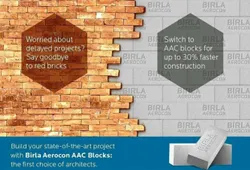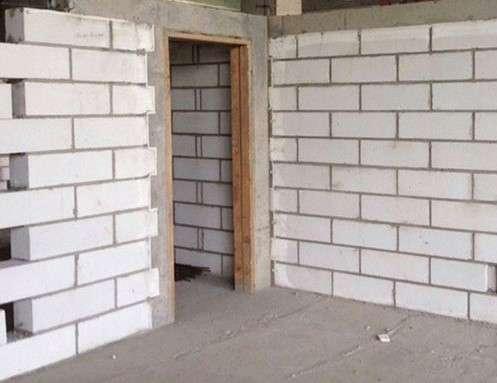AAC Blocks
₹43.0
Product Details:
| Thickness | 100MM |
| Country of Origin | Made in India |
| Design | Solid |
| Density | 550 – 650 Kg Per Cube M |
| Compressive Strength | 5+,5+ |
| Brand | Birla Aerocon |
| Shape | Rectangular |
| Material | Autoclaved Aerated Concrete |
| Size | 4inch (600X200X100mm) |
| Usage/Application | Partition Walls |
THIS RATE INCLUDING GST EX FACTORY
Autoclaved Aerated Concrete is a Lightweight, Load-bearing, High-insulating, Durable building product, which is produced in a wide range of sizes and strengths. AAC Blocks are lightweight and compared to the red bricks AAC blocks are three times lighter.
- Description
- Additional information
- Reviews (0)
- Q & A
- Sustainability Remark
- More Offers
- Store Policies
- Inquiries
| brands | Birla Aerocon |
|---|---|
| Material | Autoclaved Aerated Concrete |
| Size | 4inch (600X200X100mm) |
You must be logged in to post a review.
Q & A
Renewable Material Cellular Lightweight Concrete (RMCLC) is a type of concrete that incorporates renewable materials to reduce its environmental impact. While the specific sustainability of RMCLC can vary depending on the exact composition and manufacturing processes, I can provide you with general information on the topic.
Renewable Materials: RMCLC typically utilizes renewable or sustainable materials as part of its composition. These materials may include industrial by-products, such as fly ash (a waste product of coal combustion) or ground granulated blast furnace slag (a by-product of iron production). By incorporating these materials, RMCLC reduces the demand for virgin resources and decreases waste.
Lightweight Properties: RMCLC is lightweight compared to traditional concrete. The reduced weight is achieved by introducing air bubbles or foaming agents into the mixture. This results in a lower density concrete that requires less material and energy for construction and transportation. Lightweight concrete can contribute to reduced carbon emissions during transportation and construction processes.
Energy Efficiency: The manufacturing process for RMCLC can be energy-efficient compared to conventional concrete production. The use of renewable materials, such as fly ash or slag, can require less energy compared to the extraction and processing of virgin materials. Additionally, the foaming agents used to create air bubbles in the concrete mixture can be designed to have lower environmental impacts.
Thermal Insulation: RMCLC often exhibits better thermal insulation properties than traditional concrete. The lower density and increased air content contribute to improved thermal performance, reducing the need for additional insulation materials in buildings. Enhanced insulation can lead to reduced energy consumption for heating and cooling, thereby improving overall energy efficiency.
Durability: RMCLC can exhibit good durability, depending on the specific mix design and quality of materials used. Durable construction materials contribute to sustainability by minimizing the need for frequent repairs, replacements, and associated resource consumption.
It's important to note that sustainability is a complex concept that involves considering various factors such as resource use, energy consumption, emissions, and long-term impacts. The overall sustainability of RMCLC depends on factors such as the specific materials used, production methods, transportation distances, and end-of-life considerations.
When considering RMCLC or any other construction material, it's advisable to assess its sustainability by looking at its life cycle analysis, environmental certifications, and specific project requirements.
General Inquiries
There are no inquiries yet.




Reviews
There are no reviews yet.